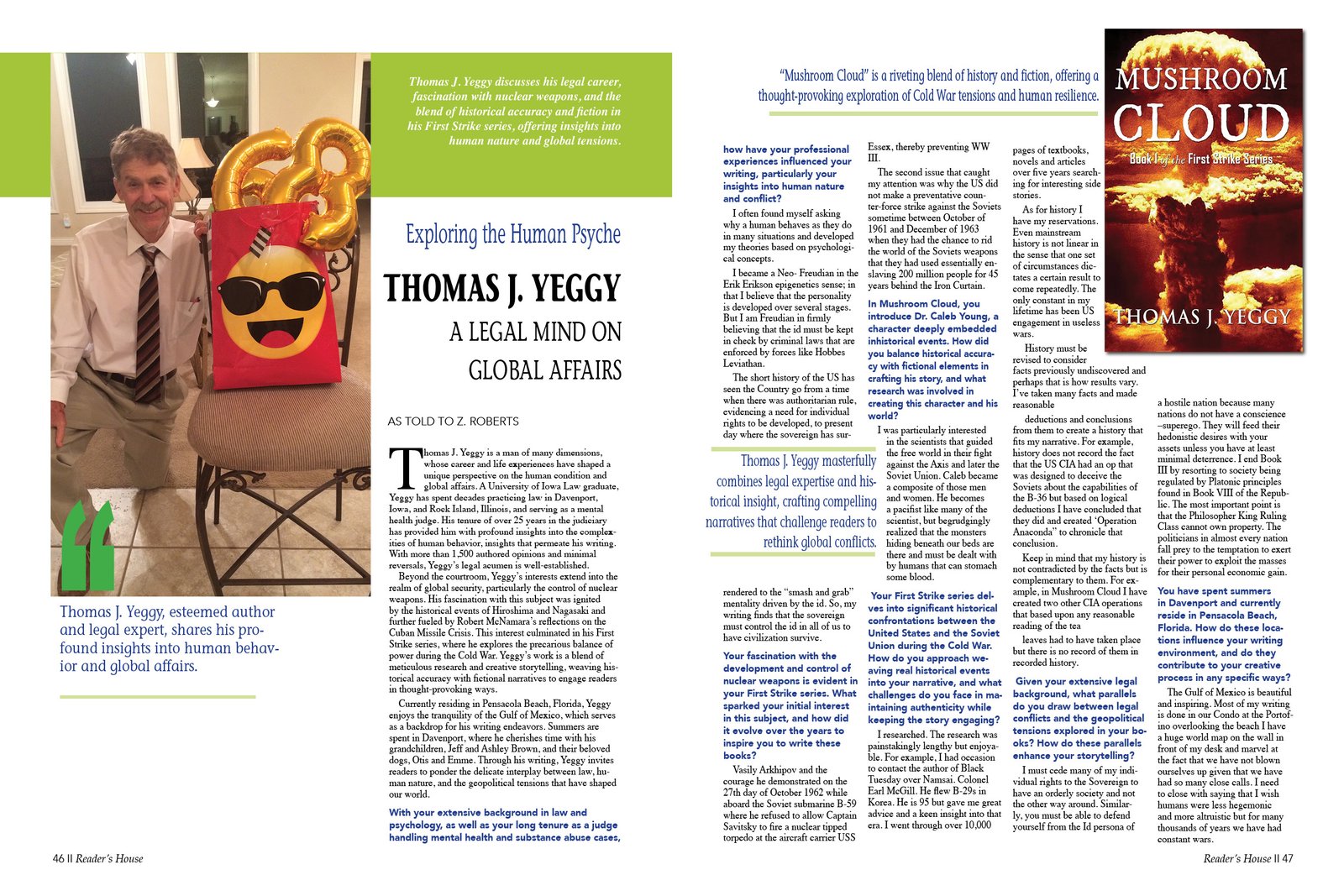A Legal Mind on Global Affairs
Thomas J. Yeggy is a man of many dimensions, whose career and life experiences have shaped a unique perspective on the human condition and global affairs. A University of Iowa Law graduate, Yeggy has spent decades practicing law in Davenport, Iowa, and Rock Island, Illinois, and serving as a mental health judge. His tenure of over 25 years in the judiciary has provided him with profound insights into the complexities of human behavior, insights that permeate his writing. With more than 1,500 authored opinions and minimal reversals, Yeggy’s legal acumen is well-established.
Beyond the courtroom, Yeggy’s interests extend into the realm of global security, particularly the control of nuclear weapons. His fascination with this subject was ignited by the historical events of Hiroshima and Nagasaki and further fueled by Robert McNamara’s reflections on the Cuban Missile Crisis. This interest culminated in his First Strike series, where he explores the precarious balance of power during the Cold War. Yeggy’s work is a blend of meticulous research and creative storytelling, weaving historical accuracy with fictional narratives to engage readers in thought-provoking ways.
Currently residing in Pensacola Beach, Florida, Yeggy enjoys the tranquility of the Gulf of Mexico, which serves as a backdrop for his writing endeavors. Summers are spent in Davenport, where he cherishes time with his grandchildren, Jeff and Ashley Brown, and their beloved dogs, Otis and Emme. Through his writing, Yeggy invites readers to ponder the delicate interplay between law, human nature, and the geopolitical tensions that have shaped our world.
With your extensive background in law and psychology, as well as your long tenure as a judge handling mental health and substance abuse cases, how have your professional experiences influenced your writing, particularly your insights into human nature and conflict?
I often found myself asking why a human behaves as they do in many situations and developed my theories based on psychological concepts.
I became a Neo- Freudian in the Erik Erikson epigenetics sense; in that I believe that the personality is developed over several stages. But I am Freudian in firmly believing that the id must be kept in check by criminal laws that are enforced by forces like Hobbes Leviathan.
The short history of the US has seen the Country go from a time when there was authoritarian rule, evidencing a need for individual rights to be developed, to present day where the sovereign has surrendered to the “smash and grab” mentality driven by the id. So, my writing finds that the sovereign must control the id in all of us to have civilization survive.
Your fascination with the development and control of nuclear weapons is evident in your First Strike series. What sparked your initial interest in this subject, and how did it evolve over the years to inspire you to write these books?
Vasily Arkhipov and the courage he demonstrated on the 27th day of October 1962 while aboard the Soviet submarine B-59 where he refused to allow Captain Savitsky to fire a nuclear tipped torpedo at the aircraft carrier USS Essex, thereby preventing WW III.
The second issue that caught my attention was why the US did not make a preventative counter-force strike against the Soviets sometime between October of 1961 and December of 1963 when they had the chance to rid the world of the Soviets weapons that they had used essentially enslaving 200 million people for 45 years behind the Iron Curtain.
In Mushroom Cloud, you introduce Dr. Caleb Young, a character deeply embedded inhistorical events. How did you balance historical accuracy with fictional elements in crafting his story, and what research was involved in creating this character and his world?
I was particularly interested in the scientists that guided the free world in their fight against the Axis and later the Soviet Union. Caleb became a composite of those men and women. He becomes a pacifist like many of the scientist, but begrudgingly realized that the monsters hiding beneath our beds are there and must be dealt with by humans that can stomach some blood.
Your First Strike series delves into significant historical confrontations between the United States and the Soviet Union during the Cold War. How do you approach weaving real historical events into your narrative, and what challenges do you face in maintaining authenticity while keeping the story engaging?
I researched. The research was painstakingly lengthy but enjoyable. For example, I had occasion to contact the author of Black Tuesday over Namsai. Colonel Earl McGill. He flew B-29s in Korea. He is 95 but gave me great advice and a keen insight into that era. I went through over 10,000 pages of textbooks, novels and articles over five years searching for interesting side stories.
As for history I have my reservations. Even mainstream history is not linear in the sense that one set of circumstances dictates a certain result to come repeatedly. The only constant in my lifetime has been US engagement in useless wars.
History must be revised to consider facts previously undiscovered and perhaps that is how results vary. I’ve taken many facts and made reasonable
deductions and conclusions from them to create a history that fits my narrative. For example, history does not record the fact that the US CIA had an op that was designed to deceive the Soviets about the capabilities of the B-36 but based on logical deductions I have concluded that they did and created ‘Operation Anaconda” to chronicle that conclusion.
Keep in mind that my history is not contradicted by the facts but is complementary to them. For example, in Mushroom Cloud I have created two other CIA operations that based upon any reasonable reading of the tea
leaves had to have taken place but there is no record of them in recorded history.
Given your extensive legal background, what parallels do you draw between legal conflicts and the geopolitical tensions explored in your books? How do these parallels enhance your storytelling?
I must cede many of my individual rights to the Sovereign to have an orderly society and not the other way around. Similarly, you must be able to defend yourself from the Id persona of a hostile nation because many nations do not have a conscience –superego. They will feed their hedonistic desires with your assets unless you have at least minimal deterrence. I end Book III by resorting to society being regulated by Platonic principles found in Book VIII of the Republic. The most important point is that the Philosopher King Ruling Class cannot own property. The politicians in almost every nation fall prey to the temptation to exert their power to exploit the masses for their personal economic gain.
You have spent summers in Davenport and currently reside in Pensacola Beach, Florida. How do these locations influence your writing environment, and do they contribute to your creative process in any specific ways?
The Gulf of Mexico is beautiful and inspiring. Most of my writing is done in our Condo at the Portofino overlooking the beach I have a huge world map on the wall in front of my desk and marvel at the fact that we have not blown ourselves up given that we have had so many close calls. I need to close with saying that I wish humans were less hegemonic and more altruistic but for many thousands of years we have had constant wars.



